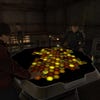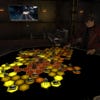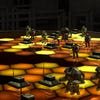The Banking Game
How the economics of gaming shed light on the financial crisis.
A child has just keeled over from exhaustion on my factory floor. I could have stopped it; when they get to that state you can give them a glass of water and they get straight back to the production line. But I've found it's cheaper to give them training instead of water. If a kid's looking peaky I can spend a little cash to have him trained up. He'll get over his exhaustion and he'll work faster. It's a win/win situation. If I let them work to the cusp of collapse before training them I maximise the amount of time they can work. I don't have to hire new workers and I don't need to waste money on a water fountain.
Littleloud's Sweatshop has me making decisions like this all the time. Do I hire older, specialised workers or just go the brute force route of creating a large (but cheap) child workforce? There's even an elegance to it, finding methods within the rules of the game to win. The factory floor is like a black box in which anything goes.
It's a similar approach that led to the largest financial crash the world has ever seen. The events of 2008 are still something that experts don't fully understand, and for the large majority of people something barely comprehended. As we learn more about the events that led to the crash, then the more parallels arise between the unregulated systems of greed that led to the crisis and the systems in the games that we play. The tools game makers employ to allow and encourage players to shed their ethics and business sense are present throughout the markets involved with the crash.
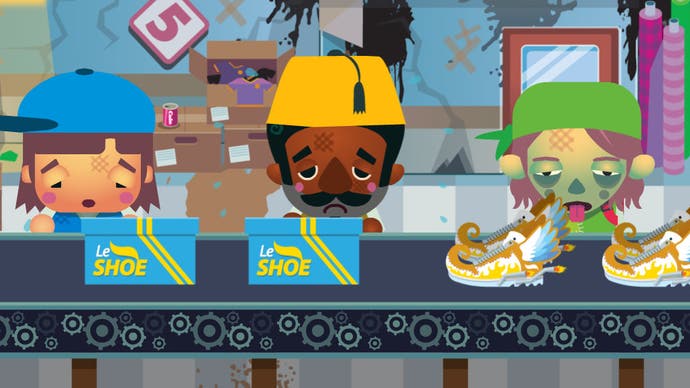
Sweatshop provides an environment that, ethically, is unregulated. The game had been commissioned by Channel 4 to teach players about the moral ambiguity surrounding sweatshops and child labour, and this lack of regulation was a deliberate choice on the part of the LittleLoud's creative director Darren Garrett: "We never wanted to dictate an answer or suggest an easy solution. If there was a bunch of facts or pop-ups commenting on your in game actions then we would lose all subtlety and turn off players."
Unregulated environments let users stretch what a system will allow; it's not cheating but working the system. But unregulated systems don't often exist in the real world - because, as Sweatshop shows, they tend to lead to unethical practices. So governments step in and close the loopholes, theoretically.
One glaring exception is the financial market. It's not just that it has weak regulation. It's that governments have spent 30 years deliberately making it weaker. Banks used to be either high street lenders or investment banks. One dealt with everyday lending for businesses and individuals, the other handled speculative investment. As an institution, an investment bank was a formal partnership for wealthy individuals to pool money so they could spend it on something they couldn't individually afford. Deregulation allowed these two separate forms of bank to join. After deregulation the money you put in your savings could be used by the bank's owners to invest in projects they couldn't previously afford, or deemed too risky for their own money.
In Sweatshop the equivalent of the old separate banking systems would be a split between training and the exhaustion cycle. So if you couldn't refresh workers by training them it would force players to buy water coolers. Players wouldn't have a choice in playing humanely. But by joining the two game mechanics, it allows the player to skimp on his own costs, passing the risk onto the worker.
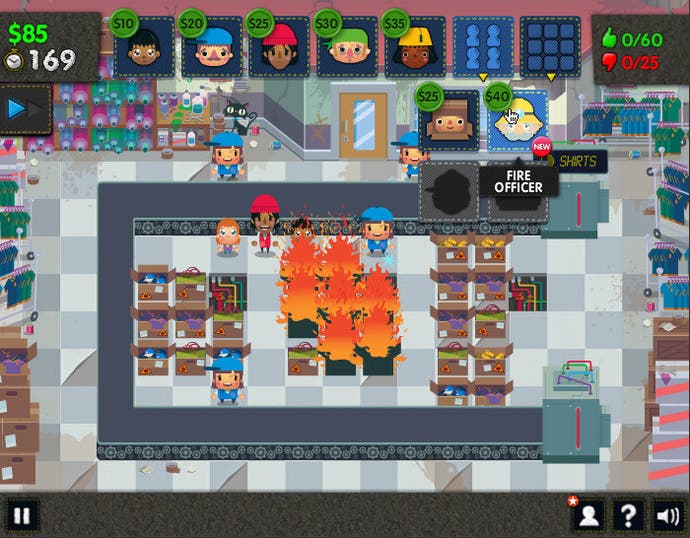
A lack of regulation isn't in and of itself a bad thing: it certainly allows abuse of a system but it doesn't encourage it. It would take some sort of catalyst to make a user search out gaps in a system's regulation. In Sweatshop it's the awards: at the end of each level you are awarded a trophy depending on the time it took you to meet your clothing quota, the number of mistakes you made, and how much money you had left over on completion. To get a gold medal you need to have the conveyor belt going at full speed and as few workers as possible, each working to their fullest capacity.
Using awards in this manner prescribes the idea that that is the right way to do something; Sweatshop's trophies reinforce the idea that the goal is production. "Our plan from the beginning," says Garrett, "was to have a system where the nature of the gameplay and drive of the narrative was to make profit by making as many clothes as quickly as possible."
Similarly, banking bonuses tied to profits suggest that the goal is to make as much profit as quickly as possible.
Of course bonuses didn't singlehandedly drive bankers to abuse the ill-regulated financial system. You'd hope the offer of money alone wouldn't cause systemic usage of unethical and unsound business practice. But the bonuses in banking play the same role the trophies do in Sweatshop: they encourage a focus on increasing short-term productivity instead of long-term security. It is fine for Sweatshop players to devolve in the manner that they do because they're playing a game with no real world ramifications. The same can't be said for banks.
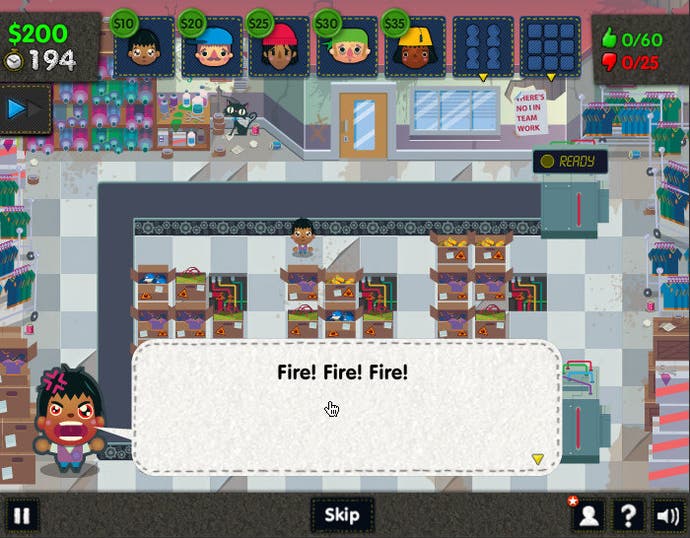
Chains of system abuse often occur in the virtual world. During the crash of 2008 there was a similar occurrence threatening to take place within CCP's Eve Online. An exploit within the MMO allowed players to create factories that pumped out valuable minerals used in making advanced tech 2 items, without using up the rare resources that were involved in the process.
Some player-run corporations began building bugged stations and creating small amounts of these valuable minerals. This made up so little of the market that CCP didn't spot the gradual influx of new money.
The bugged stations made profits for the corporations, who sold these valuable resources to other corporations within their alliance, which then allowed them to build more advanced and powerful ships, which they then used to make more money. Illegally produced minerals were part of a larger chain of ship production and corporation development. The exploit in the system was giving the corporation a profitable edge over its competitors
It wasn't until December 2007 when the Trinity expansion was released that these bugged stations started having a noticeable effect on the market. The expansion brought in new high-demand tech items. CCP had predicted that these items would drive up the price of the minerals used to make them but instead the opposite happened: the price fell as the number of trades increased.
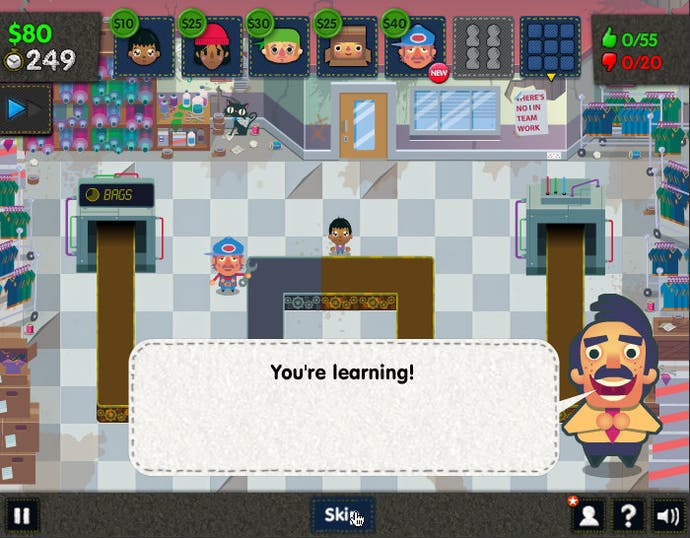
The corporations had expanded their exploit operations to prepare for the demand they knew the new expansion would bring. They didn't bring about a market crash, as the real world banks did because these valuable minerals didn't make up a large enough part of the market but it meant the players who'd obtained the minerals by legal means and had stockpiled them ready for the market boom had their profits wiped out. There simply wasn't demand to match the costs they had invested in obtaining the minerals.
This got CCP's attention.
CCP began to track the biggest traders on the market and discovered the exploit they were using to get ahead. Their response: they nuked the offending stations, banned 134 players involved in the corporations and those who were knowingly benefiting from the exploit-made goods, and then destroyed what stockpiles of illegal assets hadn't yet made it on to the market. They also patched the exploit out of their system.
They were able to do this because of the regulatory powers they have in place, as CCP's lead economist Dr. Eyjolfur Gudmundsson explains. "One of the basic regulations that we have as an operator of the game is that if you are found exploiting it you are removed and the materials that you created through the exploit are removed because it has the potential to cause an imbalance in the entire system. And the contract that you sign when you enter the game (meaning the EULA and the terms of service) explicitly prohibit you from utilising the exploit and put the requirement on you to report the exploits if you come across one, because an exploit is essentially code that is not functioning the way it's supposed to."
So the makers of Eve had put the onus on the user to flag weaknesses in the system that allowed improper play. It's the same way that some banks had discovered a malfunctioning part of the financial system that allowed them to produce something out of nothing, and then exploited it.
On comparing CCP's response to the real world response Eyjolfur said: "The difference between the two is that even though the exploit had been going on in Eve for quite some time it was still a very minor portion of the entire Eve economy. The problem with the Lehman Brothers of the world - it of course wasn't only Lehman Brothers, as they were the poster child in this case - it was such a big chunk of the entire economy that regulators have not yet found a way to move away from it without causing a severe crash."
If you were to close down a bank and seize whole sections of their assets it would be like cutting the chain: you'd leave all the other businesses linked to it hanging. Considering the size of the banks and the global nature of their transactions it's an improbable course of action. But that simply shows that our governments let the banks get too big; that the system shouldn't have allowed them to; that there should have been regulation in place. The economics of a game can serve both as a model to explain how the crisis happened, but in some cases they also demonstrate how to handle it better.












